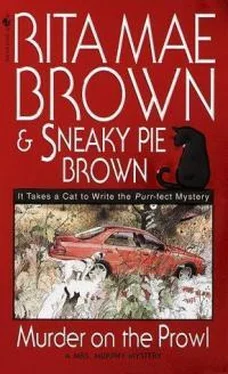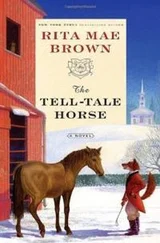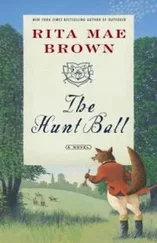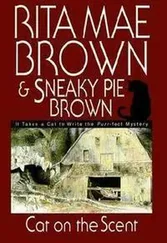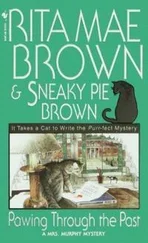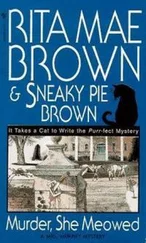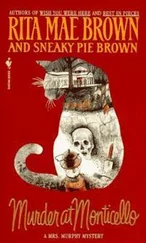As for Samson, Father Michael remembered him daily in his prayers. Samson had been reduced to physical labor at Kendrick Miller's gardening business. At least he was in the best shape of his life and was learning to speak fluent Spanish, as some of his coworkers were Mexican immigrants.
Father Michael, starting on a second cup of coffee—two lumps of brown sugar and a dollop of Devonshire cream—blinked in surprise. He thought he saw a figure sliding through the early-morning mist.
That needed jolt of caffeine blasted him out of his seat. He grabbed a Barbour jacket to hurry outside. Quietly he moved closer to a figure lurking in the graveyard.
Samson Coles placed a bouquet of flowers on Ansley Randolph's grave.
Father Michael, a slightly built man, turned to tiptoe back to the cottage, but Samson heard him.
"Father?"
"Sorry to disturb you, Samson. I couldn't see clearly in the mist. Sometimes the kids drink in here, you know. I thought I could catch one in the act. I am sorry."
Samson cleared his throat. "No one visits her."
"She ruined herself, poor woman." Father Michael sighed.
"I know. I loved her anyway. I still loved Lucinda but ... I couldn't stay away from Ansley." He sighed. "I don't know why Lucinda doesn't leave me."
"She loves you, and she's working on forgiveness. God sends us the lessons we need."
"Well, if mine is humility, I'm learning." He paused. "You won't tell her you saw me here, will you?"
"No."
"It's just that . . . sometimes I feel so bad. Warren doesn't visit her grave, and neither do the boys. You'd think at least once they'd visit their mother's grave."
"They're young. They think if they ignore pain and loss, it will fade away. Doesn't."
"I know." He turned, and both men left the graveyard, carefully shutting the wrought iron gate behind them.
At the northwest corner of the graveyard a massive statue of the Avenging Angel seemed to follow them with his eyes.
"I just so happen to have some of the best Jamaican coffee you would ever want to drink. How about joining me for a cup?"
"I hate to trouble you, Father."
"No trouble at all."
They imbibed the marvelous coffee and talked of love, responsibility, the chances for the Virginia football team this fall, and the curiousness of human nature as evidenced by the false obituary.
A light knock on the backdoor got Father Michael out of his chair. He opened the door. Jody Miller, one of his parishioners, wearing her sweats as she was on her way to early-morning field hockey practice, stood in the doorway, a bruise prominent on her cheek and a red mark near her eye that would soon blacken.
"Father Michael, I have to talk to you." She saw Samson at the table. "Uh—"
"Come on in."
"I'll be late for practice." She ran down the back brick walkway as Father Michael watched her with his deep brown eyes. He finally closed the door.
"Speaking of curious." Samson half smiled. "Everything is so important at that age."
It was.
Five minutes after Samson left, Skip Hallahan pulled into Father Michael's driveway with Sean in the passenger seat. Reluctantly, Sean got out.
"Father!" Skip bellowed.
Father Michael stuck his head out the backdoor. "Come in, Skip and Sean, I'm not deaf, you know."
"Sorry," Skip mumbled, then launched into Sean's misdeed before he'd taken a seat.
After Skip ranted for a half hour, Father Michael asked him to leave the room for a few minutes.
"Sean, I can see the humor in calling in the obituary. I really can. But can you see how you've upset people? Think of Mrs. Fletcher.
"I'm getting the idea," Sean replied ruefully.
"I suggest you call on Mrs. Fletcher and apologize. I also suggest you call Janice Walker, editor of the obituary page at the paper, and apologize, and lastly, write a letter of apology and send it to 'Letters to the Editor.' After that, I expect the paper will take your route away from you." The good priest tried to prepare him for retaliation.
Sean sat immobile for a long time. "All right, Father, I will."
"What possessed you to do this? Especially to your headmaster."
"Well, that was kind of the point." Sean suppressed a smile. "It wouldn't have been nearly as funny if I'd called in, uh, your obituary."
Father Michael rapped the table with his fingertips. "I see. Well, make your apologies. I'll calm down your father." He stood up to summon Skip Hallahan.
Sean stood also. "Thanks, Father."
"Go on. Get out of here." The priest clapped the young man on the back.
10
Every hamlet and town has its nerve centers, those places where people congregate to enjoy the delights of gossip. Not that men admit to gossiping: for them it's "exchanging information."
A small group of men stood outside the post office on the first Monday in October in buttery Indian-summer sunshine. The Reverend Herbert Jones, Fair Haristeen, Ned Tucker, Jim Sanburne—the mayor of Crozet—and Sandy Brashiers spoke forcefully about the football teams of Virginia, Tech, William and Mary, and, with a shudder, Maryland.
"Maryland's the one to beat, and it hurts me to say that," the Reverend Jones intoned. "And I never will say it in front of John Klossner."
John, a friend of Herb's, graduated from Maryland and never let his buddies forget it.
Another one of the "in" group, Art Bushey—absent this morning—had graduated from Virginia Military Institute, so there was no reason for argument there. Poor VMI's team couldn't do squat, a wretched reality for those who loved the institution and a sheer joy for those who did not.
"This is the year for Virginia, Herb. I don't care how hot Maryland has been up to now." Sandy Brashiers crossed his arms over his chest.
"Say, why aren't you in school today?" Herb asked.
"I've worked out a schedule with King Fletcher, so I don't go in until noon on Mondays." Sandy breathed in. "You know, I love young people, but they'll suck you dry."
"Too young to know what they're asking of us." Fair toed the gravel. "Now before we get totally off the subject, I want to put in a good word for William and Mary."
"Ha!" Jim Sanburne, a huge man in his middle sixties, almost as tall as Fair but twice as broad, guffawed.
"Give it up, Fair." Ned laughed.
"One of these days the Tribe will prevail." Fair, an undergraduate alumnus, held up the Victory V.
"How come you don't root for Auburn? That's where you went to veterinary school," Sandy said.
"Oh, I like Auburn well enough."
Harry, from the inside, opened the door to the post office and stood, framed in the light. "What are you guys jawing about? This is government property. No riffraff."
"Guess you'll have to go, Fair," Ned said slyly.
The other men laughed.
"We're picking our teams for this year." Jim explained the reasoning behind each man's choice.
"I pick Smith!"
"Since when does Smith have a football team?" Sandy Brashiers asked innocently.
"They don't, but if they did they'd beat VMI," Harry replied. "Think I'll call Art Bushey and torment him about it."
This provoked more laughter. Mrs. Murphy, roused from a mid-morning catnap, walked to the open doorway and sat down. She exhaled, picked up a paw, and licked the side of it, which she rubbed on her face. She liked football, occasionally trying to catch the tiny ball as it streaked across the television screen. In her mind she'd caught many a bomb. Today football interested her not a jot. She ruffled her fur, smoothed it down, then strolled alongside the path between the post office and the market. She could hear Harry and the men teasing one another with outbursts of laughter. Then Miranda joined them to even more laughter.
Mrs. Murphy had lived all her life on this plot of Virginia soil. She watched the news at six and sometimes at eleven, although usually she was asleep by then. She read the newspapers by sitting right in front of Harry when she read. As near as she could tell, humans lived miserable lives in big cities. It was either that or newspapers worked on the Puritan principle of underlining misery so the reader would feel better about his or her own life. Whatever the reason, the cat found human news dull. It was one murder, car wreck, and natural disaster after another.
Читать дальше
